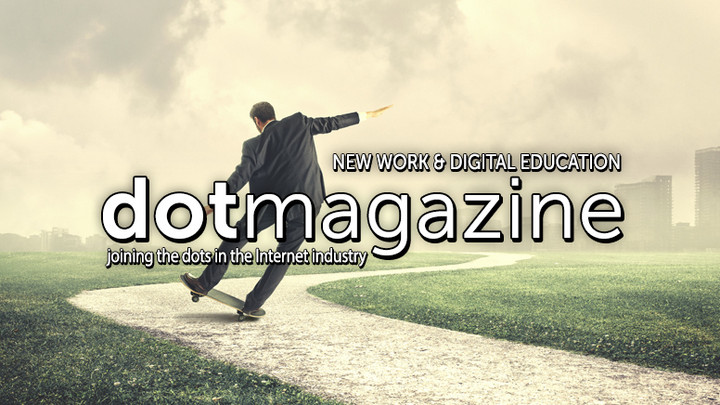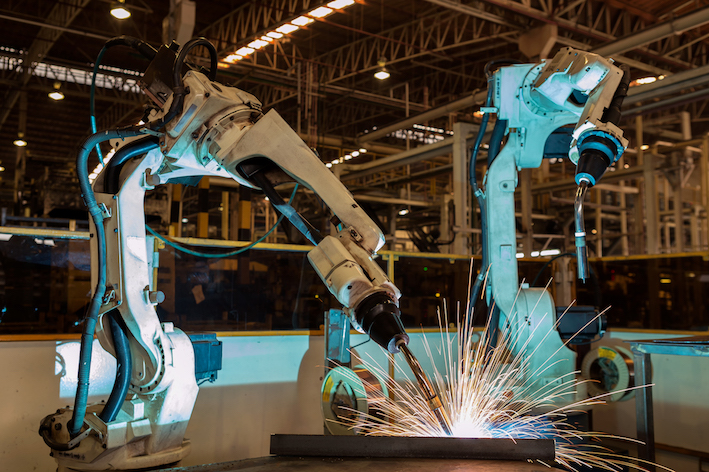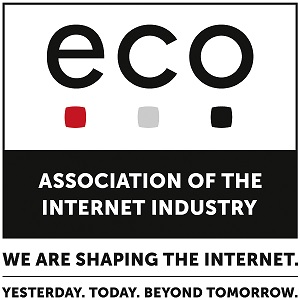doteditorial: New Freedom – Chances and Challenges of New Work
New Work offers us the creative scope to shape a better, more human working world. Lucia Falkenberg, CPO at the eco Association, allays the fears and explores the potential of digitalization to transform the world of work.

© francescoch | istockphoto.com
Welcome to dotmagazine’s issue focusing on New Work and Digital Education.
No question about it: Digitalization will have a major impact on the world of work. And to be honest, it’s clear to all of us that there are positive and negative aspects of its influence to be considered.
New Work represents the transformation to a new work culture, higher requirements for all participants when it comes to competence and engagement, and also greater personal responsibility and better reconcilability of work and individual life planning. Digitalization and the growing lack of skilled workers in specialist areas pose challenges that require companies to develop new processes for finding, managing, and retaining staff. They need to create more human working conditions for employees and thereby contribute to a company environment that is more conducive to productivity. This is why New Work is, and will remain, an important topic for the eco Association.
Fundamentally, New Work offers an improved work-life balance for workers.
It means greater freedom about where and how we fulfill our tasks, but at the same time, it means increased commitment, coordination, and negotiation. New Work focuses in principle more on result-oriented work, and it has less to do with being present for a certain number of hours per week at a certain location. This is not only good for the employees – it’s clear that when staff are more able to balance their professional and domestic responsibilities effectively, they will be more satisfied, and this can in turn lead to increased productivity in the company. But for this to function, you also need to have very clear objectives and tasks. Expectations need to be spelled out in job descriptions and proper business practices, so that we each know what we need to do, regardless of where and when we do it. And this, in turn, I see as being a very human communicative issue.
Economic and social benefits of New Work
Fulfilling these propositions, New Work can be a plus for the employee and for productivity levels. But it is also, from an economic perspective, that which we require in order to remain competitive in an international environment. When we work in a globalized world, 9 to 5 doesn’t suffice – instead, we work across time zones, across national borders, and this requires greater flexibility.
The flexible modern concept of mobile working also offers the chance to better integrate workers who would previously not have been as available to the workforce – take professional mothers as an example (for insight into the financial benefits of diversity in companies, listen to or read Elisabeth Kurek’s interview “Workforce Diversity Driving Company Performance, Innovation and Profitability”). New Work makes it more possible to find a gentler balance between professional and private life. Nowadays, it is possible to pick up the kids from kindergarten, and do another couple of hours in the evening. That would have been unthinkable 20 years ago. And with the combination of the shortage of specialists and an aging population – at least in Europe – this is not just a question of equality: we need these often very well-qualified women in the workforce. On the whole, we’re going to need a lot of specialists for the transition we have ahead of us. And we need to see that they are able to become qualified.
Transforming companies through New Work concepts
This means that companies transitioning to digitalized working environments face a range of challenges. Management processes and expectations will need to be updated to harmonize with New Work concepts. Ensuring the welfare and job satisfaction of staff, as Peer Bieber explains, is essential to recruiting and retaining well-qualified IT and technical specialists (read the interview “Attracting and Keeping Great Talent in an Employee’s Market”). Recruitment processes can also be modernized, as Jan Kirchner explains (read “How Recruitment Automation Can Boost Your HR Performance”). Ensuring ongoing professional development for all staff is also becoming an increasingly important responsibility for companies and governments, a topic I will come back to later.
And, of course, having the right technology to enable mobile working is essential (read article "Digital Infrastructure - The Unsung Hero"). According to Detlev Artelt, “In addition to solid concepts and a new corporate culture, this requires a good technical infrastructure and tools for productive collaboration” (read the article “Bricks, Bytes, & Behavior: The Space, Tools, and Culture of New Work”). These tools are the basis of UCC – Unified Communications and Collaboration – without which New Work cannot function. In terms of the infrastructure, Harald Bender provides advice to companies on the choice of cloud-based solutions for communication and collaborative tools (read “The Rise of Cloud-Based Unified Communications & Collaboration”).
Making working life easier
What will digitalization bring to the world of work? One opinion is that it will make work increasingly more human. If you look back at how hard work was at the onset of industrialization, you can see that technical innovations have led to work being designed in an increasing human way. Digitalization is a way to continue this development and make work easier and less physically demanding.
The healthcare industry offers a prime example. Of course, I can get involved in the discussion of whether I would allow my mother or my grandmother to be cared for by a robot. No, I don’t want a robot to hold my mother’s hand. But I have no problem with the care personnel being relieved of the hard physical work through digital or automated processes. Then the carer has more time and more space to take care of those things that only real people can do, and that we only want real people doing.
On the other side, employers need to make sure that the mental demands of modern working culture – with its vastly increased pace of work and the potential for information overload that characterizes so much of modern knowledge work – are compensated for in other ways in the company culture. A Corporate Social Responsibility (CSR) policy will therefore become important to ensure the well-being of staff, as well as their retention, in the long term. Healthcare programs, sport, opportunities to de-stress – such offers are not just nice and generous employee benefits but are vital to keeping a company as a whole healthy.
The jobs of today and tomorrow
There is, however, also the fear of jobs becoming obsolete through digitalization. To be very honest, this isn’t a new phenomenon at all, and has always been a side effect of technology changes since the invention of the wheel, the pulley, or typography. However, we can learn from history that work places will not be diminished as a result of digital transformation; rather, they will be transformed. A study by the German Institute for the Future of Work (IZA) also concludes that, “the fear of major job cuts in the course of digitalization is unfounded” (read my article "Bringing Education and Work into the 21st Century"). Creative and communicative competencies are becoming more highly valued, and new professions are emerging that, as recently as ten years ago, were not even in the realm of fantasy. Which HR manager had heard of the position of “Active Sourcing Manager”, “User Experience Designer”, or “Chief Digital Officer” a decade ago? What new professions will people be going into in the next couple of years for which we still don’t have job titles?
This means it will become an absolute must for companies to offer their staff ongoing professional development – to help their employees move into new, needed occupations. We certainly face a challenge here, and the only solution will be to ensure a very broad further development of competencies, both technical and knowledge-based, across all ages.
Education for a digital future
There is certainly a need for technical education – that people are encouraged to explore and develop a fascination for technology, and develop coding and other technical capabilities. But, when we think about school education, it’s about more than just the technical skills – it’s also about developing media competence. It is important that young digital natives can also take a critical perspective on the benefits of tools they use, to become competent media users. This is particularly important given that, as Alexander Rabe, Managing Director of eco, notes: "We have a new statistic that the number of students for informatics in Germany is decreasing. That means we need to act now" (watch the interview with Alexander and read the transcript “Building a Digital Future Through Education”). Above all, digital education must occur across the entire range of subjects. It needs to come out of the science and informatics classrooms, and needs to pervade all subjects – language lessons, philosophy, history. We need to move away from the silo mentality to a holistic one.
Creating the conditions for New Work
The Internet industry will act as a fundamental enabler in the building of new digitalized concepts of education, as Andreas Weiss contends: “In order for schools to be able to realize concrete educational concepts for the future, they need first and foremost to be equipped with sufficient agility in their internal organization of digital identities, and in their use of multimedia content and collaboration services. At the same time, they also need affordable but secure access devices, not to mention suitably-dimensioned network access” (read the article “The Cloud as Foundation for Digital Education”). And the opportunities that digital education bring continue throughout the entire educational cycle, as amply demonstrated by Rich Nedwich of Ruckus Networks in his article on the Smart Campus, not to mention the fact they they should enable us to move towards a more level global playing field (read Mathias Röckel's article "Some Examples of How ICT Can Help Us Solve Our Global Issues").
A collective societal discussion of these developments is essential as we move forward with digital transformation. As a society, we are being confronted with topics which, although brimming with opportunities, also engender fear and uncertainty. It is our task to think about how we want to deal with these issues as we embark into the future, and it is the task of politics to create framework conditions for our changing circumstances. Policy-makers should not make the mistake of allowing concerns about jobs prevent companies from introducing the innovations and investments necessary for the realignment of work. On the contrary, governments must also, on their part, invest in developing new concepts and technical adaptations, a point expanded upon by eco in our Internet Policy Agenda (read the excerpt "Bringing Education and Work into the 21st Century").
In place of the discontinued workplaces from the last millennium, the jobs of the future for a burgeoning digital millennium are now emerging. Politics, industry, and civil society need to work together to construct the framework conditions for the future of work – only so can digital transformation be truly successful – and eco, with its range of specializations, stands ready for this dialog as a partner for all levels of the digital value chain.
New Work is synonymous with new freedoms. Let’s make the most of the creative scope that the digital working world offers us – so that we can make sure it becomes a better, more human working world. Digitalization should not be an end in itself. It should improve and simplify life and work for people. But it requires us to take an active role in shaping this Internet-capable future.
Lucia Falkenberg is Chief People Officer with eco – Association of the Internet Industry and DE-CIX Management GmbH. Having joined eco in 2012, Lucia became Head of the eco Competence Group New Work in 2014. Prior to her role at eco, the Business Studies graduate managed her own human resources firm, where she successfully supported numerous clients in finding and retaining talented personnel. Lucia also previously worked as an international HR representative for an American IT company. Her extensive experience and know-how across the entire human resources spectrum is of particular benefit when it comes to advising executives and developing and implementing targeted personnel marketing and recruitment strategies. As a professional mother and woman working in the digital sector, Lucia benefits directly from the opportunities offered by the digital world of work.





